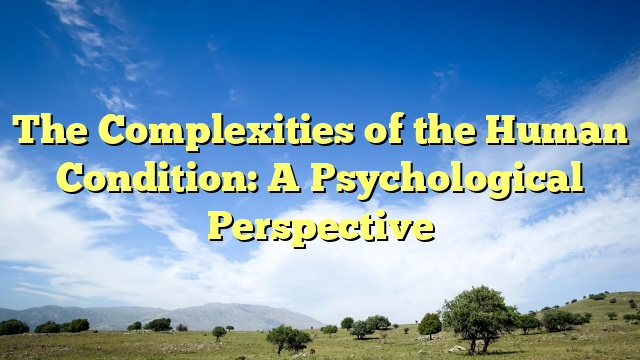The Complexities of the Human Condition: A Psychological Perspective
The Complexities of the Human Condition: A Psychological Perspective
Understanding the human condition is a complex and multifaceted endeavor. From the way we think and feel to the way we behave and interact with others, the human condition encompasses a wide range of experiences and emotions. In this article, we will explore the complexities of the human condition from a psychological perspective, delving into the various factors that contribute to our understanding of what it means to be human.
Factors Contributing to the Human Condition
There are numerous factors that contribute to the complexities of the human condition. These include biological, psychological, social, and cultural influences, all of which play a role in shaping our thoughts, feelings, and behaviors. From a biological perspective, our genetic makeup and neurochemistry can influence our predisposition to certain mental health conditions and personality traits. On a psychological level, our past experiences and traumas can impact our emotional well-being and cognitive functioning. Social and cultural factors, such as family dynamics, societal norms, and cultural traditions, also play a significant role in shaping our identities and influencing our behavior.
Common Themes in the Human Condition
Despite the diversity of human experiences, there are several common themes that are often present in the human condition. These include the pursuit of happiness, the experience of suffering, the search for meaning and purpose, and the struggle for self-acceptance and belonging. These themes are universal and transcend cultural and societal boundaries, highlighting the shared human experience that unites us all.
Challenges in Understanding the Human Condition
One of the greatest challenges in understanding the human condition is the complexity and variability of human experiences. Each individual is unique, with their own set of beliefs, values, and experiences that shape their understanding of the world. Additionally, the human condition is constantly evolving, influenced by changes in society, technology, and global events. As a result, it can be difficult to capture the full scope of the human condition and the factors that contribute to it.
Psychological Perspectives on the Human Condition
Psychology offers valuable insights into the complexities of the human condition, providing a framework for understanding the ways in which our thoughts, emotions, and behaviors are shaped by internal and external factors. From a cognitive perspective, psychologists study the ways in which our thoughts and beliefs influence our perceptions and decision-making processes. In the realm of emotion, psychologists explore the various factors that contribute to our emotional experiences, including biological, psychological, and social influences. Additionally, psychologists examine the ways in which our behaviors are influenced by our past experiences, social interactions, and cultural norms.
Implications for Mental Health and Well-Being
Understanding the complexities of the human condition has important implications for mental health and well-being. By gaining insight into the factors that contribute to our thoughts, feelings, and behaviors, individuals can develop a greater sense of self-awareness and understanding. This, in turn, can lead to more effective coping strategies, improved interpersonal relationships, and a greater sense of fulfillment and purpose in life. Additionally, a deeper understanding of the human condition can inform the development of more effective interventions and treatments for mental health conditions, ultimately improving the quality of life for individuals and communities.
Conclusion
The human condition is a complex and multifaceted phenomenon that encompasses a wide range of experiences and emotions. From the biological and psychological factors that shape our thoughts and behaviors to the social and cultural influences that impact our identities, the human condition is a rich and diverse tapestry of experiences. By exploring the complexities of the human condition from a psychological perspective, we can gain valuable insights into the factors that contribute to our understanding of what it means to be human, ultimately leading to a greater sense of self-awareness and well-being.

